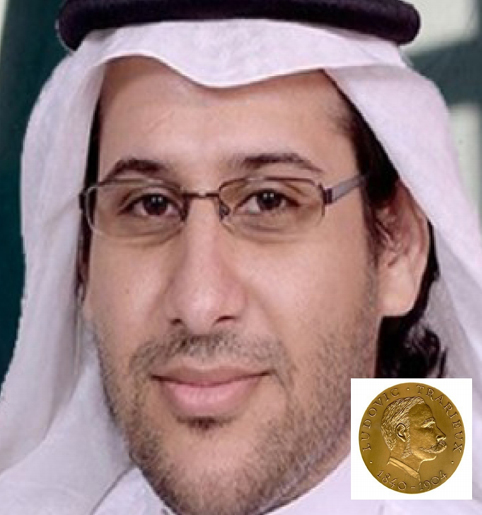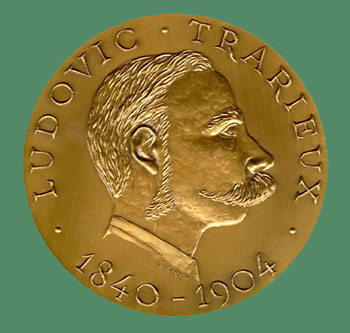Ludovic-Trarieux International-Human Rights Prize 2015
Prix International des
Droits de l'Homme Ludovic-Trarieux 2015
Premio
Internacional de Derechos Humanos
Ludovic Trarieux 2015
Premio Internazionale per i Diritti Umani Ludovic Trarieux 2015
Internationalen Ludovic-Trarieux-Menschenrechtspreis 2015
Prêmio Internacional de Direitos Humanos Ludovic Trarieux 2015
Ludovic Trarieux
Internationale Mensenrechtenprijs 2015
Depuis/Since/Desde/Dal/Sinds 1984
“L’hommage des avocats à un avocat ”
“The award given by lawyers to a lawyer”
“El homenaje de abogados
a un abogado ”
“L'omaggio degli avvocati ad un avvocato”
“Die Hommage von Anwälten zu einem Anwalt”
« De award gegeven door advocaten
een advocaat »
THE LUDOVIC-TRARIEUX PRIZE 1985 (PDF)
The XXth "Ludovic-Trarieux" Human Rights International Prize
2015
awarded to

Waleed Abu al-Khair
(Saudi Arabia)
Ludovic-Trarieux
Prizewinner 2015
« sentenced
to to 15 years
in prison under the January 2014 terrorism
law. … »
The XXth "Ludovic-Trarieux"
Human Rights International Prize 2015
A Jury composed of 21 european lawyers coming from the bars of Paris, Bordeaux,
Amsterdam, Berlin, Brussels, Geneva, Luxemburg, Roma, together with the
European Bar Human Rights Institute (IDHAE) and the Union Internationale
des Avocats (UIA) meeting in Amsterdam Bar Association Office on
June 12th 2015, awarded the
20th Ludovic trarieux
Human Rights Prize to Saudi lawyer Waleed Abu al-Khair.
Waleed Abu Al-Khair is the founder of the Monitor of Human Rights inSaudi Arabia (MHRSA) was last year handed a 15-year
sentence on six charges by a specialized court in connection with his work.
Waleed Abu Al-Khair has long campaigned for reforms in the conservative
kingdoms through the Monitor of Human Rights in Saudi Arabia (MHRSA) organisation he founded. Currently in jail himself, he
represented his brother-in-law prominent blogger Badawi
who has been jailed for 10 years and sentenced to 1,000 lashes for insulting
Islam.
The sentence was met by
worldwide condemnation and Badawi, 31, has already
received the first 50 lashes outside a mosque in the Red Sea city of Jeddah on
January 9. Subsequent rounds of punishment have been postponed.
The prize will be handed
over at a ceremony in Geneva on 27 November 2015.
Waleed Abu Al-Khair
is a human rights lawyer and founder of the Monitor of Human Rights in Saudi
Arabia (MHRSA).
Waleed Abu Al-Khair,
who is harassed fot several years, was involved in
multiple ongoing court proceedings. Relating to these separate charges, Waleed
Abu Al-Khair is banned from travelling outside the
country was in place. On 2 October 2013, Saudi authorities
detained prominent human rights lawyer Waleed Abu Al-Khair
for setting up an alleged “unauthorized” gathering because had been hosting a
forum to exchange ideas with other reformists, known as a "diwaniah", at his home in the western city of Jeddah.
He has since been transferred for further questioning to the interrogation
office by the Public Prosecutor of Jeddah city, but he has been released on
bail on October 3th.
On 29 October 2013, a Jeddah court
sentenced Waleed Abu Al-Khairi to
three months’imprisonment for signing a public
statement critical of the regime. He announced that he will appeal the
verdict. The three-month sentence was in relation to Waleed Abu Al-Khair's signature on a public statement “condemning the
trials against Jeddah Reformists, and the events in Qutayef.”
The statement was signed by academics and activists and posted online on 5
December 2012. The inquiry into other signatories was closed after they issued
an apology, which Waleed Abu Al-Khair refused to do.
On February 4, 2014, the Court of Appeals in Mekkah, approved a 3-month
sentence for charges of contempt of the judiciary against. However, Waleed Abu
al-khair remained free.
Abu al-Khair’s
trial before the Specialized Criminal Court – Saudi Arabia’s terrorism tribunal
– opened in October 2013. The authorities jailed him on April 15, 2014,
following his fifth trial session after the interior minister issued a
detention order under the January 2014 terrorism law. The law gives the
Interior Ministry the authority to jail suspects in terrorism cases. Abu al-Khair refused to respond to the charges against him during
the trial. He referred instead to a hand-written note he submitted to the judge
declaring that he did not recognize the legitimacy of the court.
There are numerous irregularities in the
trial of Abu Al-Khair. At the hearing on 9 September,
the Public prosecutor handed over to the court a flash memory drive without
declaring its contents, in addition to a copy of a statement about the trial of
Jeddah reformists and the events of Qatif issued on 5
December 2011 and signed by Abu Al-Khair on behalf of
the group, Monitor of Human Rights in Saudi Arabia (MHRSA), which he heads.
On July 6, 2014, the court sentenced
Waleed Abu al-Khair to 15 years in prison. The court
found Abu al-Khair guilty on six charges: “seeking to
remove legitimate authority;” “harming public order in the state and its
officials;” “inflaming public opinion and disparaging and insulting judicial
authority;” “publicly slandering the judiciary, distorting the kingdom’s reputation,
making international organizations hostile to the kingdom, and issuing
unverified statements that harm the kingdom’s reputation and incite against it
and alienate it;” “founding an unlicensed organization;” and violating Saudi
Arabia’s anti-cybercrime law.
The court suspended five years of the
sentence, but it also included a 15-year ban on travel abroad after the prison
term is served and a hefty fine, of 200,000 riyals ( 46 957 €). Following the
court hearing, Abu al-Khair’s organization announced
that he will not sign or appeal the verdict. But Public Prosecutor has appealed
the primary sentence at the Court of Appeal in Riyadh, as he had not retreated
or apologized to the court.
On 12 January 2015, the Specialised Criminal Court in Riyadh removed the suspension
and sentenced Waleed Abu Al-Khair to serve the full
sentence of 15 years in prison. Throughout the hearing his legs were shackled.
On 4 February 2015, authorities
transferred him for the sixth time of his imprisonment to former Ha'ir prison reform. On April 18, 2015, Abu Al-Khair, who faces continued harassment in prison, lodged a
complaint to the prison administration regarding beatings happened on the same
day. To date the complaint has not been considered. On April 21, 2015, as retaliation
for lodging the complaint, Abu Al-Khair, was beaten,
threatened and insulted by another prisoner in Al-Ha’ir
rehabilitation prison in Riyadh, where he has been detained since his transfer
from Malaz prison on February 4, 2015. Later on,
policemen came to the cell of Abu Al-Khair and threw
all his belongings on the ground, searching for prohibited items.
On 6 July 2014, he had received the
primary sentence of 15 years in prison, with five years suspended, and a travel
ban of equal duration as well as a fine of 200,000 SR. (approximately
$53,300).The Public Prosecutor has appealed the primary sentence at the Court
of Appeal in Riyadh, which said that he should serve the entire 15 years
sentence, as he had not retreated or apologized to the court.
MEMBERS OF THE JURY IN 2015
Bâtonnier
Germ Kemper
Bâtonnier
Bertrand Favreau
Bâtonnier
Jean-Marie Burguburu
Bâtonnier
Yves Oschinsky
Bâtonnier
Pierre Sculier
Adrie
van de Streek
Hans
Gaasbeek
Brigitte
Azema-Peyret
Frédéric
Krenc
Isabelle
Bühler Galladé
Arnaud
Moutinot
Marc
Joory
Pascal
Venderveren
Julie
Goffin
Christophe
Pettiti
Nicole
Derhy
Laurence
Azoux-Bacrie
Zbigniew
Cichon
Marie-France
Guet
François
Moyse
Bernd
Haüsler
“The tribute
given by lawyers to a lawyer”
Created in 1984, the "International Human Rights
Prize Ludovic -Trarieux” is
awarded to " a lawyer, regardless of nationality or Bar, who thoroughout his career has illustrated, by his activity or
his suffering, the defence of human rights, the
promotion of defence rights, the supremacy of law,
and the struggle against racism and intolerance in any form ".
It is the oldest and most prestigious award given to a
lawyer in the world, commemorating the memory of the French lawyer, Ludovic Trarieux (1840-1904), who
in the midst of the Dreyfus Affair, in France, in 1898, founded the "
League for the Defence of Human Rights and the
Citizen ", because, he said: " It was not only the single cause of a
man which was to be defended, but behind this cause, law, justice, humanity
".
The first Prize was awarded on March 29th, 1985 to
Nelson Mandela then in jail. It was officially presented to his daughter, Zenani Mandela Dlamini, on April
27th 1985, in front of forty presidents of Bars and Law Societies from Europe
and Africa. It was the first award given to Mandela in France and the first
around the world given by lawyers. On February 11th 1990, Nelson Mandela was
released. Since then, it was decided that the Prize would be awarded again.
Since 2003, the Prize is awarded every year in
partnership by the Human Rights Institute of The Bar of Bordeaux, the Human
Rights Institute of the Bar of Paris, the Human Rights Institute of The Bar of
Brussels, l'Unione forense
per la tutela dei diritti dell'uomo (Roma), Rechtsanwaltskammer Berlin, the Bar of Luxemburg, the Bar
of Geneva, the Bar of Amsterdam as well as the Union Internationale
des Avocats (UIA), and the European Bar Human Rights
Institute (IDHAE) whose members are the biggest european
law societies fighting for human rights. It is presented every year in a city
that is home to one of the member Institutes.
1985: Nelson MANDELA (South Africa)
1992: Augusto ZÚÑIGA PAZ (Peru) †
1994: Jadranka CIGELJ
(Bosnia-Herzegovina)
1996 Nejib
HOSNI (Tunisia) and Dalila MEZIANE (Algeria).
1998 ZHOU Guoqiang (China)
2000 Esber YAGMURDERELI
(Turkey)
2002 Mehrangiz KAR (Iran)
2003 Digna OCHOA and Bárbara ZAMORA
(Mexico)
2004: Akhtam NAISSE (Syria)
2005:
Henri BURIN DES ROZIERS (Brazil)
2006: Parvez IMROZ (India)
2007 :
René GÓMEZ MANZANO (Cuba)
2008 : U AYE MYINT (Burma)
2009 : Beatrice MTETWA (Zimbabwe)
2010 : Karinna MOSKALENKO (Russia)
2011 : Fethi TERBIL (Libya)
2012 : Muharrem ERBEY (Turkey)
2013 :
Vadim KURAMSHIN (Kazakhstan)
2014 : Mahienour el-MASSRY (Egypt)
